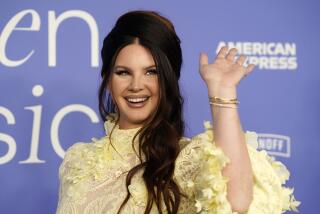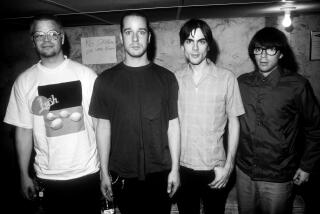O.C. Pop Music Review : Even Downers Are Haggard Highs
It was a clearly bemused Merle Haggard who related to the Crazy Horse Steak House audience Monday night that he had picked up a recent copy of the Gavin Report--a leading radio trade magazine--to find a new category.
“It’s a chart called ‘Adult Americana,’ ” he said. “And it encumbers people over 40, like me. I was looking up the list and seeing some names I recognized, like Waylon Jennings, Tom Petty and Mary-Chapin Carpenter. And I worked up to the No. 1 spot, and there in the first week of this chart was an album called ‘Tulare Dust’ of all these younger people doing my songs.”
While Haggard sounded puzzled by this development--who, short of a piece of Ethan Allen furniture, wants to be regarded as Americana?--he also was clearly proud of the achievement.
Another Haggard tribute album, “Mama’s Hungry Eyes,” is a major-label release crowded with top country stars that has held a slot on Billboard’s country albums chart for 15 weeks. Haggard made no mention of it. “Tulare Dust,” meanwhile, is nowhere to be found on that important chart, is on the small HighTone label and is peopled largely by non-mainstream songwriters such as Joe Ely, Iris DeMent, Lucinda Williams, Dave Alvin and John Doe (Dwight Yoakam is there too).
Haggard has won virtually every award country music has to bestow, most recently an Academy of Country Music Lifetime Achievement Award. Yet he seemed to take a special pride in having the regard of “Tulare Dust’s” maverick crew.
Indeed, during his second show Monday (he was also booked for two shows at the club Tuesday), Haggard declared of the Buena Park-raised DeMent, “Iris DeMent is the best thing I’ve heard since Jimmie Rodgers.” (Rodgers and Bob Wills were Haggard’s musical heroes, and he once recorded a double-album of Rodgers’ tunes.)
Perhaps the “Tulare Dust” news put him in a good mood. Maybe he was just goosed a bit by the electric shocks he was getting from poorly grounded stage equipment, but, whatever the reason, Haggard’s two sets were among his finest local showings in years.
The Hag has done some of the goofiest songs in country music--including “Rainbow Stew” and a slew of drinking songs--but the celebration in them is given a special nudge by the melancholy that is always waiting right around the corner in a Haggard show. This is, after all, the man who made a Christmas album for which the lead track was glumly titled “If We Make It Through December.”
*
Some arctic peoples have scores of words just to describe the various gradients and qualities of snow; Haggard has a similar eye for the minutiae of melancholy, for the depths of feeling that can accompany life’s sadnesses.
That’s what Haggard and his tremendously responsive band, the Strangers, tapped into--particularly in the early show. They played with such a sad beauty that it made hard times and sadness seem entirely worth the bother.
Following a warm-up from his band and singer, ex-wife Bonnie Owens, Haggard began his first show strongly with “Working Man’s Blues,” “Big City” and “I Think I’ll Just Stay Here and Drink.” Perhaps because it’s covered on “Tulare Dust,” Haggard performed “They’re Tearing the Labor Camps Down” with the emotion of one who had lived in those Dust Bowl-era housing camps in his youth.
His craggy voice was in fine form, and his band remains one of the most distinctive outfits in American music, with a signature style and musical empathy that recalls Duke Ellington’s glory days, or the Grateful Dead’s, for that matter.
*
Most of his band members have been with him for ages--pedal steel player Norm Hamlet has been with him since 1968--and even more recent additions Joe Manuel on lead guitar and brother Abe Manuel on fiddle seem directly plugged into Haggard’s moods. Fiddle player Jim Belkins--a vet who recently returned to the band--lent some particularly lyrical and emotional solos to the songs.
Haggard took a few solos of his own on his custom Telecaster. While his technique is not nearly as refined as that of his band members, he has a way of making a solo speak. His two-chorus outing on “Where the Lonely Go” was nearly as expressive as his voice.
Outside of Asleep at the Wheel, Haggard is one of very few country acts keeping Bob Wills’ Western swing-style alive. Touches of its jazzy lilt cropped up in many of his songs, and it was delivered unadulterated in Wills’ “Ida Red,” where he and Joe Manuel sent harmony guitar lines swinging.
*
The versions of some of his own classics were nearly definitive. “Silver Wings” carried the ache of seeing one’s dreams depart in a jet, with Hamlet’s ethereal pedal steel seeming like a cloudy sky.
In “Kern River,” Haggard sang of a love swept away in the currents, and it seemed a heart-chilling metaphor for never again risking feelings when he sang, “I may drown in still water, but I’ll never swim Kern River again.” Along with songs like “That’s the Way Love Goes” and “Today I Started Loving You Again,” the first show could nearly have been packaged as “Merle’s Greatest Downers.”
His second show wasn’t nearly as moody. When he sang “Mama Tried,” it was with the tenderness of an old memory rather than a convict pondering his young life turned wrong.
“Rainbow Stew” was its usual brew of whimsy, while . . . Wow, hey howdy! There’s GARTH BROOKS!!! Lookit there!
Yes, right in mid-show Haggard announced the presence of Brooks, fresh from his American Music Awards appearance at the Shrine Auditorium in Los Angeles, taking in the show of his hero, Haggard.
*
Brooks, shaking hands with audience members from amid a phalanx of Crazy Horse security, slowly waded through the crowd up to the stage, waved, shook a few more hands and then left.
One might have thought they’d do a few songs together; instead, perhaps they were looking ahead to some day when they can warmly reminisce: “Say, remember that swell night at the Crazy Horse when we got together onstage and didn’t do squat?”
Brooks’ presence was enough to get a standing ovation from the crowd, and they took a while to settle down, prompting Haggard to say, “Now I know how Bob Wills felt when I walked in on him one night in 1966.”
The appearance of country music’s reigning king didn’t distract from Haggard’s show for long, though. He followed impressively with “Mama’s Prayer,” a sing-along “Okie From Muskogee” and “Are the Good Times Really Over,” closing with Willie Nelson’s “If You’ve Got the Money, I’ve Got the Time.”
More to Read
The biggest entertainment stories
Get our big stories about Hollywood, film, television, music, arts, culture and more right in your inbox as soon as they publish.
You may occasionally receive promotional content from the Los Angeles Times.






